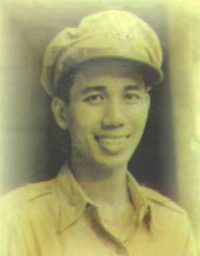Bataan
Limay Hospital
Helluva day. Almost died. It was noontime and the sun was very hot. So I stood under the shade of a tall tree beside the municipal building of Limay. The general was standing at the entrance of the building talking with colonels Sevilla, Garcia, and Caluyag. I was talking to Major Mascardo, former aide of President Quezon. Mascardo was telling me about the narrow escapes he had from bombs dropped in Camp Murphy and he said it was bad to be near the transmitter of the Signal Corps. Suddenly somebody shouted: “Planes! Planes!” I saw the general run for his life. Instinctively I dove flat. In a second I heard the droning of many bombers. They were diving towards us. I closed my eyes and prayed. Louder and louder came the planes. Then the eerie swishing of bombs and more bombs. The earth trembled. My chest was compressed by the concussion. My ears hummed. More bombs exploded. Trees fell and a pall of smoke filled the entire area. The municipal building began to burn and I was partly covered with mud. When the planes were gone, I slowly stood up. I was shaking from head to foot. I looked around and everything was burning. Two trucks loaded with troops were hit by incendiary bombs. In a nipa shack which was partially destroyed, there was a woman crying for help. The driver of Major Mascardo’s jitney lay sprawled beside a fence, an ugly gash on his brow and a piece of iron sticking out of his left eye. I saw the mangled bodies of three officers and two drivers who were playing dice under a mango tree. The dice was still in the hands of the chauffeur. I saw Fernando Poe, cinema star, running across the field with a soldier on his shoulder who was covered with blood. He was rushing the man to the medical department. Tony Arrieta was shouting for assistance because he said three of his friends were hit and bleeding to death across the road. Meanwhile Mascardo’s jitney caught fire. The gasoline tank exploded and the box of ammunition inside the car started to explode. I didn’t know where to go or what to do. I just stood pale and looked at everything blankly. Then the chaplain told me to accompany him to the truck with the troops. None of the passengers were saved. There they sat on their seats like carbon statues, charred to death, their rifles beside them. They could not be identified except for names or initials scratched on their helmets. Fred saw a helmet with his brother’s name. He asked me to look for the corpse but there were too many and it was almost impossible to distinguish. I told him “Maybe that’s just a fellow with same name, Fred.” But he wouldn’t be consoled. He is probably still examining each and every corpse. Under one of the Pasay trucks, I saw the body of an American boy. He was only partially burnt but a shrapnel pierced his lungs. I walked to the nearby schoolhouse as everything around me was burning and I could no longer stand the stench of roasted human flesh. Under the schoolhouse, I saw my general crouched beside Major Monserrat. The general was wounded on the shoulder.
